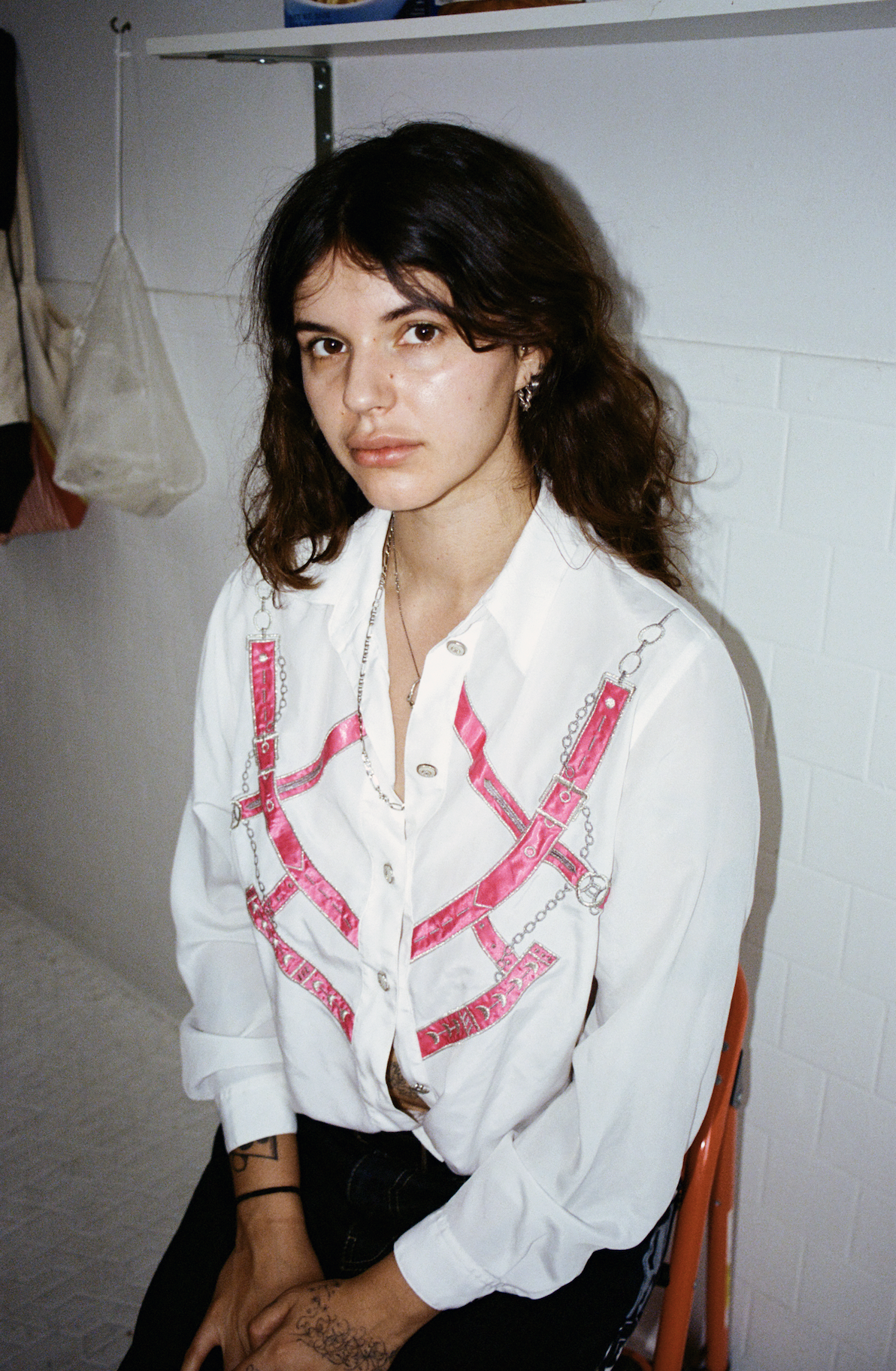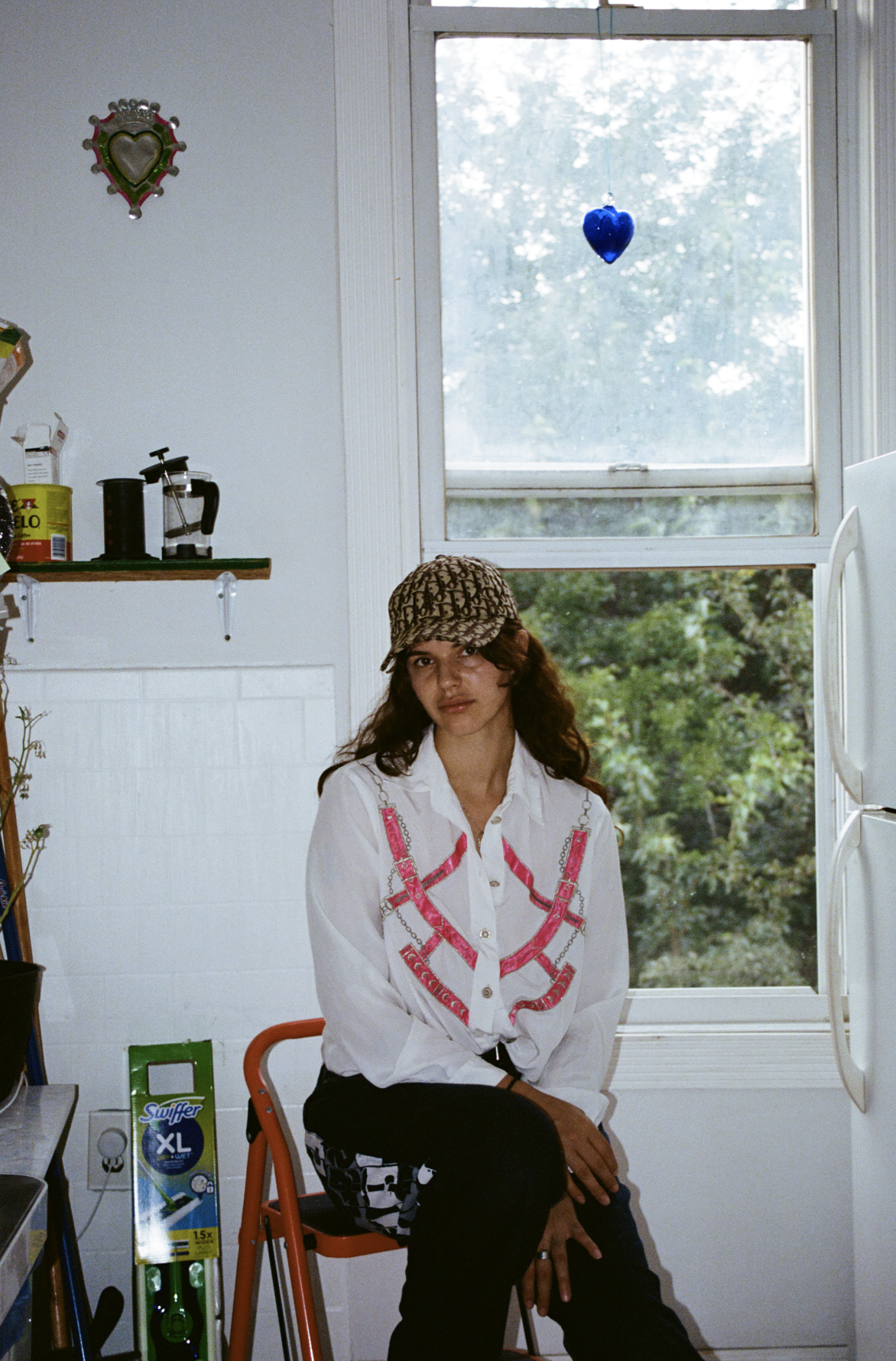“I am a mentally ill bitch that still serves.”
- X3butterfly
3 OCT 2021

Sorrelle (they/them) NYC ︎
I was born here in New York City. I was living in Europe for the past six years, and now I currently have come full circle. I moved back here.
When and how did you start djing?
It was completely serendipitous. I had no intention of being a Berlin meme starter pack, like goes to Berlin once sort of thing. I was raised with dance as my main art form. I am a dancer until the day I die. It's always going to be an intrinsic part of my practice and how I identify. When I moved to Berlin, I was a bit disappointed with the dance culture there. I didn't really feel like anything was satiating my thirst for dance. I had started dating somebody that had a music project since 15 years old and just happened to have cdjs laying around. And the first time that I started, what made me realize that this could be a thing was when I was messing around with the cdjs during a house party, people came into the room thinking I was an actual dj who is already established. They were like, “wait, I didn't know you dj’d,” and I was like, “I don’t. This is the first time I've ever even touched this equipment. I have no idea what I'm doing.” But apparently it worked. I feel like it translates well, because being a dancer, you have to have rhythm and musicality and an ear. And I wanted to become a drummer at some point, but I moved to Berlin, and I sort of never looked back from there. It was really fun for me to work on something new and have people be so receptive to a medium that I never thought that I could really create something with. That gave me a new spark.
![]()
Did you continue doing any kind of dance in Berlin while you were djing?
I feel like I grieve over dance a lot because there's a part of you that when when you fully nurture something, it's your own child,—and for me, that was my body and my dance practice,—you realize at some point you have to let that go due to circumstances. And it's not that I I have to let it go, but it's so demanding, and it's really hard to balance my time as is. I tried to dance a bit when I was in Berlin, but at that time in my life, I had debilitating mental health issues. I physically could not get out of bed for months at a time, and that really created a barrier between me and my practice. I think that's why music, in a way, was a saving grace. It was much more accessible to me than dance was.
![]()
It’s cool how you embody yourself as a dancer in your djing. Are there other words that you would add to the fact of this transitioning? Or I guess not transitioning because I don't want to say that you went from dancing to djing per say, but—
No, but I actually think that is a beautiful term because by saying that, you know, as an analogy, for me being a trans nonbinary person, I think that is a good way to define it because transitioning doesn't mean necessarily going from one state to another. It's not linear. It doesn't have to be the end result, and it doesn't have to be binary or black and white. It’s also a good reinforcement for me to remember that transitioning can be many things. It’s a good affirmation to keep it in mind because I often feel imposter syndrome with a lot of things, with djing, with gender expression and identity. It’s a lot of walls to break down to feel like your authentic self is exactly what you feel you are despite how people perceive you. I definitely think that there’s an overall shift that's also happening, and it's amazing to see now, a lot of queer people to the front of all of these major clubs that, you know, even five years ago, was not happening as much.
![]()
Do you have inspirations that influence your djing?
Whether I consciously realize it or not, I am so influenced based on how poor my mental health is at the time. I listened back on sets, for example, and realized knowing how I was and what state I was in at that time, I can totally hear how that shapes my sound selection. I kind of love that because it feels really fluid, and I love having this element of surprise, you know. It's sort of like, “Oh, what? What are they going to play now? What type of set is this?” And I also don't want to ever get stale. I like having this transformative element. I think that's sort of why I chose the name actually, x3butterfly. I mean, it's also a reference to my childhood. You know AIM, you can't have symbols. So I always had screen names that had x3 because it makes a heart. But also, butterflies are one of my favorite creatures. It's crazy how something that can barely move on the ground has this grand transformation into this beautiful flying creature.
Photo + Text by Cat Marchenko
When and how did you start djing?
It was completely serendipitous. I had no intention of being a Berlin meme starter pack, like goes to Berlin once sort of thing. I was raised with dance as my main art form. I am a dancer until the day I die. It's always going to be an intrinsic part of my practice and how I identify. When I moved to Berlin, I was a bit disappointed with the dance culture there. I didn't really feel like anything was satiating my thirst for dance. I had started dating somebody that had a music project since 15 years old and just happened to have cdjs laying around. And the first time that I started, what made me realize that this could be a thing was when I was messing around with the cdjs during a house party, people came into the room thinking I was an actual dj who is already established. They were like, “wait, I didn't know you dj’d,” and I was like, “I don’t. This is the first time I've ever even touched this equipment. I have no idea what I'm doing.” But apparently it worked. I feel like it translates well, because being a dancer, you have to have rhythm and musicality and an ear. And I wanted to become a drummer at some point, but I moved to Berlin, and I sort of never looked back from there. It was really fun for me to work on something new and have people be so receptive to a medium that I never thought that I could really create something with. That gave me a new spark.

Did you continue doing any kind of dance in Berlin while you were djing?
I feel like I grieve over dance a lot because there's a part of you that when when you fully nurture something, it's your own child,—and for me, that was my body and my dance practice,—you realize at some point you have to let that go due to circumstances. And it's not that I I have to let it go, but it's so demanding, and it's really hard to balance my time as is. I tried to dance a bit when I was in Berlin, but at that time in my life, I had debilitating mental health issues. I physically could not get out of bed for months at a time, and that really created a barrier between me and my practice. I think that's why music, in a way, was a saving grace. It was much more accessible to me than dance was.

It’s cool how you embody yourself as a dancer in your djing. Are there other words that you would add to the fact of this transitioning? Or I guess not transitioning because I don't want to say that you went from dancing to djing per say, but—
No, but I actually think that is a beautiful term because by saying that, you know, as an analogy, for me being a trans nonbinary person, I think that is a good way to define it because transitioning doesn't mean necessarily going from one state to another. It's not linear. It doesn't have to be the end result, and it doesn't have to be binary or black and white. It’s also a good reinforcement for me to remember that transitioning can be many things. It’s a good affirmation to keep it in mind because I often feel imposter syndrome with a lot of things, with djing, with gender expression and identity. It’s a lot of walls to break down to feel like your authentic self is exactly what you feel you are despite how people perceive you. I definitely think that there’s an overall shift that's also happening, and it's amazing to see now, a lot of queer people to the front of all of these major clubs that, you know, even five years ago, was not happening as much.

Do you have inspirations that influence your djing?
Whether I consciously realize it or not, I am so influenced based on how poor my mental health is at the time. I listened back on sets, for example, and realized knowing how I was and what state I was in at that time, I can totally hear how that shapes my sound selection. I kind of love that because it feels really fluid, and I love having this element of surprise, you know. It's sort of like, “Oh, what? What are they going to play now? What type of set is this?” And I also don't want to ever get stale. I like having this transformative element. I think that's sort of why I chose the name actually, x3butterfly. I mean, it's also a reference to my childhood. You know AIM, you can't have symbols. So I always had screen names that had x3 because it makes a heart. But also, butterflies are one of my favorite creatures. It's crazy how something that can barely move on the ground has this grand transformation into this beautiful flying creature.
Photo + Text by Cat Marchenko
